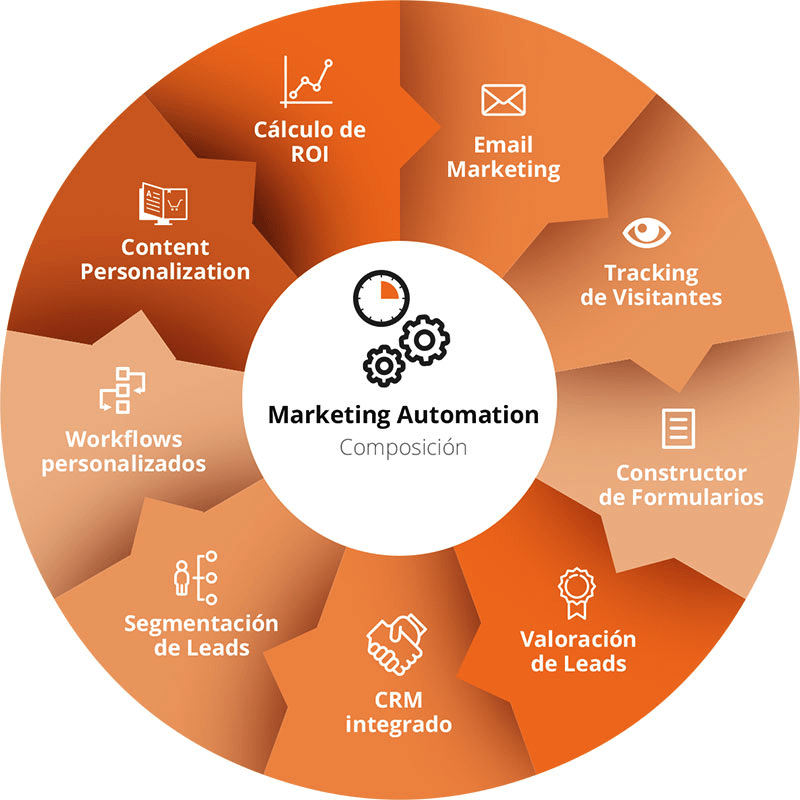Marketing automation is a powerful tool for businesses. It helps streamline marketing tasks.
But what exactly is marketing automation? Marketing automation involves using software to automate repetitive marketing actions. This can include email marketing, social media posting, and ad campaigns. The goal is to improve efficiency and deliver a more personalized experience to customers.
By automating these tasks, businesses can save time and focus on more strategic activities. Additionally, it allows for better tracking and analysis of marketing efforts. This leads to smarter decision-making and improved results. Understanding marketing automation can be a game-changer for businesses of all sizes. Dive in to learn more about this essential tool and how it can benefit your marketing strategy.
Introduction To Marketing Automation
Marketing automation has changed the way businesses operate. It uses technology to manage marketing processes and campaigns across multiple channels. This powerful tool helps businesses streamline their tasks, save time, and improve efficiency.
Definition And Importance
Marketing automation refers to software platforms and technologies designed to automate repetitive tasks. These tasks include email marketing, social media posting, and ad campaigns. Automation helps in targeting potential customers more effectively.
The importance of marketing automation cannot be overstated. It allows businesses to nurture leads with personalized content, which increases conversion rates. It also provides valuable insights through data analytics, helping businesses make informed decisions.
Evolution Of Marketing Automation
Marketing automation has come a long way. Initially, it started with basic email marketing tools. Over the years, it has evolved to include complex systems with artificial intelligence and machine learning capabilities.
Here is a brief timeline of its evolution:
| Year | Milestone |
|---|---|
| 1990s | Introduction of email marketing tools |
| 2000s | Growth of CRM systems integrating marketing automation |
| 2010s | Integration of social media and multi-channel marketing |
| 2020s | Use of AI and machine learning in marketing automation |
Today, marketing automation is more than just sending emails. It involves creating personalized experiences for customers based on their behavior and preferences. Businesses that use marketing automation can better understand their audience and deliver the right message at the right time.

Credit: www.constantcontact.com
Key Features Of Marketing Automation
Marketing automation simplifies and streamlines marketing tasks. It uses software to automate repetitive actions. The goal is to enhance efficiency and deliver personalized experiences. Here are some key features of marketing automation:
Email Marketing
Email marketing is a core feature of marketing automation. It allows businesses to send targeted messages. These messages can be personalized based on user behavior. This helps in nurturing leads and boosting engagement.
Key benefits include:
- Automated email campaigns
- Segmentation of email lists
- Personalized content
- Performance tracking and analytics
Social Media Integration
Social media integration is another vital feature. It helps businesses manage their social media accounts from one platform. Marketers can schedule posts, track performance, and engage with followers.
Key benefits include:
- Scheduling and publishing posts
- Monitoring social media activity
- Engaging with customers
- Analyzing social media metrics
Lead Management
Lead management is crucial for converting prospects into customers. Marketing automation tools help in capturing, scoring, and nurturing leads. This ensures that only qualified leads are passed to the sales team.
Key benefits include:
- Lead capture and tracking
- Lead scoring based on behavior
- Automated lead nurturing
- Integration with CRM systems
Benefits Of Marketing Automation
Marketing automation is transforming how businesses operate. It offers many benefits that improve efficiency, customer experience, and analytics. Let’s explore these benefits in detail.
Increased Efficiency
Marketing automation helps businesses save time. Tasks that took hours now take minutes. This includes email campaigns, social media posts, and lead nurturing. Teams can focus on strategy rather than repetitive tasks. Automation tools handle data entry and segmentation. This improves workflow and reduces errors.
Improved Customer Experience
Automation allows for personalized communication. Customers receive messages tailored to their needs. This leads to higher engagement and satisfaction. Automated responses ensure customers are never left waiting. Consistent follow-ups build trust and loyalty.
Personalized content can include:
- Product recommendations
- Birthday greetings
- Special offers
Enhanced Analytics
Marketing automation provides detailed insights. You can track campaign performance in real-time. This helps in making data-driven decisions. Automation tools offer reports on:
- Open rates
- Click-through rates
- Conversion rates
Comparing different campaigns becomes easier. This ensures continuous improvement.
Choosing The Right Marketing Automation Tool
Choosing the right marketing automation tool can transform your business strategies. With many options available, it is crucial to pick the one that fits your needs. This section will guide you through the process to find the perfect tool for your business.
Assessing Business Needs
Before selecting a marketing automation tool, identify your business goals. Understand what you want to achieve with automation. Do you need to improve email marketing? Or maybe you want to boost lead generation? Knowing your objectives will help narrow down the choices.
Consider your current marketing processes. Are there any repetitive tasks that consume time? These tasks can be automated to increase efficiency. Evaluate your team’s skills. Ensure the tool you choose aligns with their expertise.
Key Factors To Consider
When choosing a marketing automation tool, several factors come into play:
- Ease of Use: The tool should have a user-friendly interface. Your team should be able to navigate it without extensive training.
- Integration: Check if the tool integrates with your existing systems. This includes your CRM, email service, and other platforms.
- Features: Look for features that align with your goals. Common features include email campaigns, lead scoring, and analytics.
- Scalability: Choose a tool that can grow with your business. It should accommodate increasing data and users.
- Support: Reliable customer support is crucial. Ensure the tool provider offers good support through various channels.
- Cost: Compare the pricing of different tools. Make sure the tool fits your budget while meeting your needs.
| Factor | Considerations |
|---|---|
| Ease of Use | User-friendly interface, easy navigation |
| Integration | Compatibility with existing systems |
| Features | Email campaigns, lead scoring, analytics |
| Scalability | Ability to grow with your business |
| Support | Reliable customer support |
| Cost | Affordability, value for money |
By considering these factors, you can select a tool that will enhance your marketing efforts.
Implementing Marketing Automation
Implementing marketing automation can transform your business processes. It saves time, increases efficiency, and enhances customer engagement. But, how do you start? Below are the crucial steps to get you going.
Planning And Strategy
Begin with a clear planning and strategy. Understand your business goals. Identify the tasks you want to automate. Create a list of repetitive tasks. These could include email campaigns, social media posts, or lead nurturing.
Next, define your target audience. Know their preferences and behavior. This helps in tailoring your automated messages. Use data analytics to gather insights. This will guide your strategy. Set measurable objectives. This could be increasing open rates or boosting conversions.
Team Training And Onboarding
Team training and onboarding is essential. Your team needs to understand the new tools. Arrange training sessions. These should cover the basics and advanced features of the software.
Create an onboarding plan. This could include:
- Introduction to the software
- Hands-on practice sessions
- Regular follow-up sessions
Encourage your team to ask questions. Provide them with resources. These could be tutorials, guides, or support forums. Make sure they feel confident using the tools. This ensures smooth implementation and better results.
A simple table to summarize the steps:
| Step | Action |
|---|---|
| 1 | Define Business Goals |
| 2 | Identify Tasks to Automate |
| 3 | Understand Target Audience |
| 4 | Set Measurable Objectives |
| 5 | Arrange Team Training |
| 6 | Create Onboarding Plan |

Credit: innova-ms.com
Best Practices For Marketing Automation
Marketing automation helps businesses to automate repetitive tasks. This allows them to focus on more strategic activities. To make the most out of marketing automation, follow best practices. These will guide you to use your tools effectively and efficiently.
Segmentation And Targeting
Segmentation and targeting are crucial in marketing automation. By dividing your audience into smaller groups, you can create more relevant messages. Here are some tips:
- Understand your audience: Collect data on your customers’ behaviors and preferences.
- Create segments: Group your audience based on demographics, interests, or past interactions.
- Target effectively: Send tailored messages to each segment. This increases engagement and conversion rates.
Content Personalization
Content personalization makes your messages more relevant to your audience. This practice involves tailoring your content to meet the specific needs of each user. Here’s how to do it:
- Use dynamic content: Customize emails and web pages based on user data.
- Leverage user behavior: Track user actions on your website to deliver personalized content.
- Incorporate user preferences: Use data from previous interactions to personalize future messages.
| Practice | Benefit |
|---|---|
| Segmentation and Targeting | Higher engagement and conversion rates |
| Content Personalization | Increased relevance and user satisfaction |
Common Challenges And Solutions
Marketing automation can help businesses streamline their processes. But it comes with its own set of challenges. Addressing these issues is crucial to maximize its benefits. Let’s explore some common challenges and their solutions.
Data Integration Issues
One major challenge is integrating data from various sources. Different platforms often store data in unique formats. This can cause inconsistencies and errors. It makes it hard to get a unified view of your customer data.
To solve this, use tools that support data integration. Many marketing automation platforms offer built-in connectors. These help in syncing data seamlessly. Regular audits also ensure data accuracy.
Measuring Roi
Measuring the return on investment (ROI) in marketing automation can be tricky. Automation involves multiple touchpoints and channels. Tracking the performance of each is vital. But it can be complex.
Use analytics tools to track your campaigns. They provide insights into performance. Set clear goals and KPIs for your campaigns. Regularly review these metrics to understand your ROI better.
Future Trends In Marketing Automation
The future of marketing automation is bright and promising. With the rise of new technologies, businesses can now automate their marketing strategies more effectively. This not only saves time but also increases efficiency. Let’s explore some of the key trends shaping the future of marketing automation.
Ai And Machine Learning
Artificial Intelligence (AI) and Machine Learning (ML) are transforming marketing automation. These technologies enable personalized customer experiences. AI can analyze vast amounts of data quickly. This helps businesses understand customer behavior better. ML algorithms predict future trends. This allows marketers to adjust their strategies proactively. Here are some benefits of AI and ML in marketing automation:
- Improved customer segmentation
- Enhanced targeting and personalization
- Automated content generation
- Real-time decision making
Predictive Analytics
Predictive analytics is another trend in marketing automation. It uses historical data to predict future outcomes. This helps businesses anticipate customer needs. They can then tailor their marketing efforts accordingly. Predictive analytics can be used for:
- Identifying potential leads
- Forecasting sales trends
- Optimizing marketing campaigns
- Improving customer retention
| Feature | Benefits |
|---|---|
| AI and Machine Learning | Personalized experiences, data analysis, future trend prediction |
| Predictive Analytics | Lead identification, sales forecasting, campaign optimization |
These trends are shaping the future of marketing automation. Businesses that embrace these technologies will stay ahead. They will deliver more effective and personalized marketing strategies.

Credit: encharge.io
Frequently Asked Questions
What Is Marketing Automation?
Marketing automation refers to software platforms that streamline and automate marketing tasks. It improves efficiency and personalizes customer interactions.
How Does Marketing Automation Work?
Marketing automation works by using software to automate repetitive marketing tasks. It leverages data to personalize and optimize marketing efforts.
Why Use Marketing Automation?
Marketing automation saves time, increases efficiency, and enhances customer engagement. It allows for personalized marketing strategies and better ROI.
What Are The Benefits Of Marketing Automation?
Marketing automation offers benefits like improved efficiency, increased productivity, better targeting, and enhanced customer experiences. It drives higher conversion rates.
Conclusion
Marketing automation simplifies tasks and improves efficiency. It saves time and reduces errors. Businesses can target the right audience more effectively. It strengthens customer relationships and boosts sales. Automation tools are essential in modern marketing strategies. They help businesses stay competitive and grow.
Adopting these tools can lead to significant benefits. Start small, then expand as you become comfortable. With automation, your marketing efforts will be more streamlined and successful. Embrace the change and watch your business thrive.

I am a passionate digital marketer with a strong expertise in SEO and article writing. With years of experience in crafting compelling content and optimizing it for search engines, I help businesses enhance their online visibility and drive organic traffic. Whether it’s creating engaging blog posts or implementing effective SEO strategies, I am dedicated to delivering results that make an impact.
